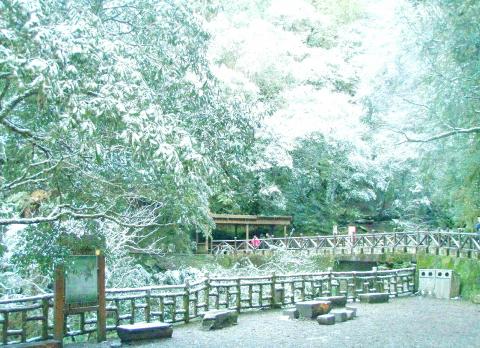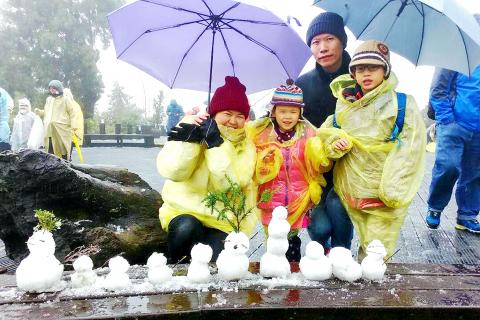The Central Weather Bureau yesterday issued a special warning about low temperatures, heavy rain and strong winds as a cold front shrouded the nation in cold, moist air.
Temperatures of less than 10˚C have been recorded, the bureau said, adding that most areas also experienced strong winds yesterday.
The weather warnings were issued as the strongest cold snap to hit Taiwan in 10 years made its impact felt early yesterday.

Photo: courtesy of the Taoyuan Department of Tourism
At 5:30am a low of 11.7˚C was recorded in Taipei and 1.3˚C on Yushan (玉山).
The cold front is likely to last until Tuesday, the bureau said.
Snow is rarely seen in the nation except on the highest mountains of central and southern Taiwan. With the weather bureau warning of an strong cold front many people began to head for Hehuanshan (合歡山) and other mountains to wait for the expected snow.

Photo: CNA
Early yesterday, up to 350 vehicles passed through a checkpoint close to Hehuanshan, blocking one lane of the highway. The checkpoint was set up to prevent vehicles from going further up the mountain during the night for safety reasons.
The Health Promotion Administration yesterday released tips to prevent cardiovascular illness triggered by the cold weather. The administration said low temperatures can increase blood viscosity, induce vasoconstriction (where the walls of blood vessels narrow and constrict) and increase the risks of intravascular clotting, as well as the likeliness of triggering coronary heart disease.
People with the “three highs” — high blood pressure, high blood lipids and high blood sugar — should remember to take prescribed medication, avoid overeating and severe emotional fluctuations, drink warm water and eat food high in natural fiber to help prevent constipation, it said.
People with the “three highs” are one-and-a-half times more likely to develop heart disease over a five-year period, administration official Chia Shu-li (賈淑麗) said, adding that it is important for the elderly and people with heart disease to keep themselves warm at all times.
She said they should avoid going outdoors for exercise early in the morning when the temperature is extremely low, prepare warm clothes besides their bed before going to sleep so that they can wear them as soon as possible when they get up the next morning.
People who use hot springs should avoid staying in the water for more than 15 minutes to prevent acute cardiovascular events, the administration said, adding that people should also remember to stand up slowly when getting out of hot springs and that people with chronic cardiovascular disease should be accompanied.
The administration said that people with diabetes, hypertension or high cholesterol should keep the water temperature below 40˚C and avoid using hot springs within two hours of eating a large meal or drinking alcohol.
If a person feels sudden chest pain, chest tightness, difficulty breathing or speaking, or experiences numbness or paralysis in the face, legs or arms, he or she should see a doctor immediately, the administration said.

Chinese spouse and influencer Guan Guan’s (關關) residency permit has been revoked for repeatedly posting pro-China videos that threaten national security, the National Immigration Agency confirmed today. Guan Guan has said many controversial statements in her videos posted to Douyin (抖音), including “the red flag will soon be painted all over Taiwan” and “Taiwan is an inseparable part of China,” and expressing hope for expedited reunification. The agency last year received multiple reports alleging that Guan Guan had advocated for armed reunification. After verifying the reports, the agency last month issued a notice requiring her to appear and explain her actions. Guan

GIVE AND TAKE: Blood demand continues to rise each year, while fewer young donors are available due to the nation’s falling birthrate, a doctor said Blood donors can redeem points earned from donations to obtain limited edition Formosan black bear travel mugs, the Kaohsiung Blood Center said yesterday, as it announced a goal of stocking 20,000 units of blood prior to the Lunar New Year. The last month of the lunar year is National Blood Donation Month, when local centers seek to stockpile blood for use during the Lunar New Year holiday. The blood demand in southern Taiwan — including Tainan and Kaohsiung, as well as Chiayi, Pingtung, Penghu and Taitung counties — is about 2,000 units per day, the center said. The donation campaign aims to boost

The Kaohsiung Tourism Bureau audited six hotels in an effort to prevent price gouging ahead of Korean band BTS’ concert tour in the city scheduled for Nov. 19, 21 and 22 this year. The bureau on Friday said that the audits — conducted in response to allegations of unfair pricing posted on social media — found no wrongdoing. These establishments included the local branches of Chateau de Chine, Hotel Nikko, My Humble House, and Grand Hai Lai, it said, adding that the Consumer Protection Commission would have penalized price gougers had the accusations been substantiated. The bureau said the Tourism Development Act

BACK TO WINTER: A strong continental cold air mass would move south on Tuesday next week, bringing colder temperatures to northern and central Taiwan A tropical depression east of the Philippines could soon be upgraded to be the first tropical storm of this year, the Central Weather Administration (CWA) said yesterday, adding that the next cold air mass is forecast to arrive on Monday next week. CWA forecaster Cheng Jie-ren (鄭傑仁) said the first tropical depression of this year is over waters east of the Philippines, about 1,867km southeast of Oluanpi (鵝鑾鼻), and could strengthen into Tropical Storm Nokaen by early today. The system is moving slowly from northwest to north, and is expected to remain east of the Philippines with little chance of affecting Taiwan,